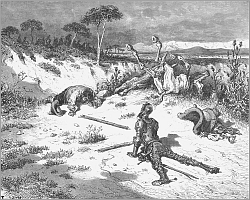Chapter 4 – Snow Blower

One day Bandolero awoke and thought he had died and gone to heaven. Everything was white. Bright white. And he couldn’t feel anything. It seemed as though he was numb all over. He had to think awhile about this. He couldn’t remember getting shot, or falling off his horse, or having a heart attack, or anything that would account for being dead. While going through a list of possibilities he heard something strange. It sounded like “mmmph, mmmph, mmmph.” Suddenly there was a whoosh and Blacky the outlaw was staring down at him.
“Are you dead, too?” Bandolero asked.
“Don’t be stupid, Bando, it snowed last night! Get up!”
And, indeed, it had snowed, and snowed a lot. This explained everything, which was very reassuring to Bandolero since it meant he had not lost his memory, after all.
“Y’know,” he said to Blacky, blowing on his fingers because they were still numb, “we’re gonna need a snow blower to get the horses out of the stable.”
“No problem,” said Blacky, “there’s one lives two houses down.”
“Very funny,” snorted Bandolero. “But that’s not exactly the kind of snow blower I meant.”
Which was, true, it wasn’t.
“Ha-ha!” laughed Blacky as they unpacked the shovels from their saddlebags.
[N.B.: There’s really more to this chapter. Bandolero wouldn’t pull a fast one on his loyal followers by publishing identical material in a blog article and a memoirs chapter. That just wouldn’t be right. The thing is, it is this very chapter that Bandolero was writing when he fell asleep that night and was buried in a blanket of snow. Nevertheless, the remainder of the chapter has been reconstructed from notes scribbled on paper scraps that were discovered many years later at an animal shelter in Las Cruces, New Mexico. How they came to be there is a mystery that has dogged scholarly researchers to this day.]
After digging out their bedrolls and other personal belongings, Bandolero discovered that his manuscript was not among the items dug out. Consequently, he dug more, and more, and more looking for it. Blacky even threw in a hand for a while; but, it seemed hopeless.
“We’re just gonna have to come back in the spring,” Blacky finally said, “after the snow melts.”
Bandolero knew he was right.
The following spring they returned.
“Is this the place?” asked Bandolero, standing up in the stirrups to get a better look and squinting as he surveyed the surrounding landscape.
“Pretty sure,” said Blacky, “though I probably wouldn’t bet my life on it.” Which was an incredibly more loaded statement than Bandolero could have guessed at the time. It had taken Blacky years of intense and painful counselling and self examination to overcome a gambling addiction that he picked up during an ill-begotten stay at a house in New Orleans that cultural anthropologists called the Rising Sun and theologians called the Rising Son.
“Hey, look at that dog over there,” said Blacky, pointing to a dog that was over there watching. “Wonder where he lives?”
It was a good question. There weren’t any farms or towns or any place that would have been a normal home for a dog.
The dog hung around the whole day, mostly expressionless but occasionally licking its lips in anticipation of paper treats. This was a strange dog, needless to say, and kept its distance which the humans probably thought was weird since a typical dog would have gradually crept closer over the course of the day in hopes of the kind of treats typically of interest to stray dogs in the middle of nowhere, like leftover bones from a pot roast or ribeye. But this dog kept its distance, which was a tad farther than a stone’s throw from the humans although, as it turned out, it wasn’t really necessary because these humans, in contrast to most the dog had encountered over the years, didn’t throw stones or anything else at it. Finally, the humans tired of whatever they were doing, which the dog never could figure out, and bedded down for the night, which was when the dog trotted over to the campsite to poke around for more of the paper treats these same humans (yes, he remembered them) had brought the last time they were in the area.
“Wonder where that dog went?” Bandolero wondered out loud the next morning as he and Blacky washed the breakfast dishes in a nearby creek.
“Don’t know about the dog,” responded Blacky, scratching his butt, “but I’d sure like to know what the hell happened to our goddam toilet paper.”
“There’s a nearly brand new roll in your saddlebag,” answered Bandolero.
“Wrong, Keemo Sobbay,” growled Blacky, with a suspicious look at Bandolero. “I hadda wipe with leaves this morning, and I think I mighta got holda some smartweed.”
Bandolero looked over at Blacky, who looked back with his patented suspicious eye.
“Hey, man, don’t look at me! I put it back in there myself last night just afore we turned in.”
Blacky looked away toward the other side of the creek. He knew Bandolero was right, now that he mentioned it. He’d seen him put it there.
“Well, just the same, it weren’t there this morning.”
“Hmm,” said Bandolero, thoughtfully. This was disturbing news. He had just broke wind and, while not loud enough for Blacky to notice, being upwind, he knew that he, himself, would shortly be in need of the precious roll.
Later, having decided they were running low on necessities as well as likely spots to find a manuscript, the duo decided to call it quits and head for the nearest dry goods store.
“Kinda weird, that dog, don’tcha think?” mused Bandolero as they saddled up.
“Who cares?” responded Blacky. “Just take better care of your goddam diary in the future.”
“’Snot a diary,” Bandolero responded defensively, “it’s a manuscript.”
“Whatever,” said Blacky.
“Woof,” said the dog, who had been listening unseen from over a nearby ridge.